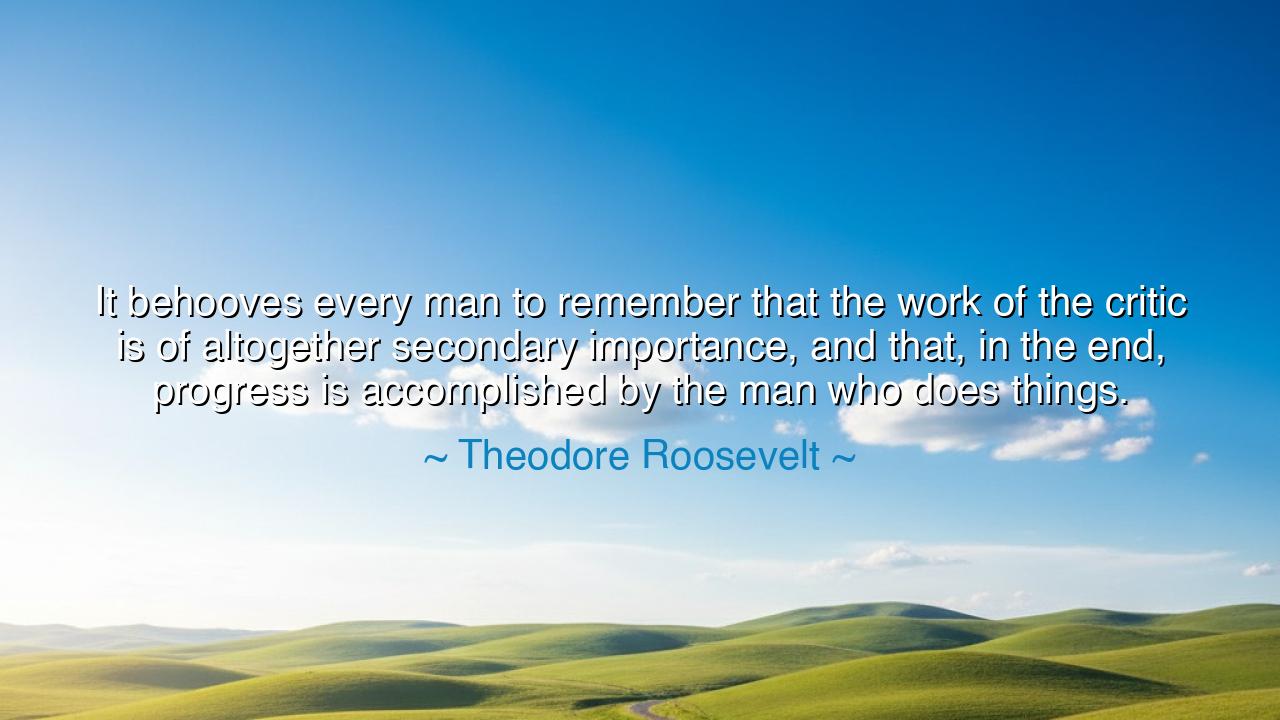
It behooves every man to remember that the work of the critic is
It behooves every man to remember that the work of the critic is of altogether secondary importance, and that, in the end, progress is accomplished by the man who does things.






Hear the bold and timeless words of Theodore Roosevelt, a man of action and vision: “It behooves every man to remember that the work of the critic is of altogether secondary importance, and that, in the end, progress is accomplished by the man who does things.” These words ring like the clash of swords, calling forth the ancient truth that deeds, not words, shape the destiny of nations and peoples.
The critic, though often clever and eloquent, stands apart from the forge where the world is shaped. He may judge, mock, or praise, but his voice alone does not build bridges, win battles, or heal the wounds of society. His work has value only in guiding or inspiring, never in replacing action itself. Roosevelt reminds us that to dwell solely in judgment is to remain in the shadows while others labor in the light.
True progress comes from those who do things — the builders, the explorers, the warriors of spirit and hand who dare to risk failure in pursuit of greatness. Their garments may be stained with sweat and dust, their hands roughened by toil, yet their efforts move the world forward. History remembers these doers, not for their perfection, but for their courage to act while others merely spoke.
Roosevelt’s words rise from the heart of his own age, a time of industrial growth, political strife, and the forging of modern nations. As a leader and reformer, he himself was no mere observer but a man of relentless energy. His belief was born of experience: that the future belongs to those who step into the arena, who strive even when they stumble, and who dare much for the sake of a greater good.
Let future generations hold fast to this wisdom: the voices of critics will always echo through the halls of life, but they must never drown out the steady march of those who work. Be among the doers, the makers, the dreamers who give their vision form through action. For in the end, the legacy of humankind is written not by those who stand aside and speak, but by those whose hands build the world anew.






MNlo minh nuyet
Roosevelt’s words suggest that progress is made by those who take action, but doesn’t that make the critic’s role more challenging? In a society that often celebrates doers, do critics risk being undervalued, even though their input can shape the direction of progress? Is the desire for results sometimes so strong that we forget the importance of thoughtful analysis and criticism in creating long-lasting change?
VD9.2.15 Doan Van Duc
This quote resonates with me because it emphasizes the importance of action, but I can’t help but wonder if it overlooks the role of criticism in the process. Progress is indeed achieved by those who do things, but how do we ensure that their actions are leading to the right outcomes? Isn’t feedback and constructive criticism crucial to making sure the work is moving in the right direction?
GDGold D.dragon
Roosevelt’s message about the secondary importance of criticism is compelling, but I wonder if this dismisses the value that critics bring to the table. Critics can often point out flaws and offer perspectives that help improve ideas or products. Does the absence of constructive criticism ultimately hinder progress, or is Roosevelt simply arguing that action is the key to real change, not just talking about it?
NVBinh Nguyen van
Theodore Roosevelt’s quote really highlights the value of action over criticism. It makes me think about how easy it is to become caught up in analyzing or criticizing others, instead of actually doing the work ourselves. But does this mean critics have no place in society? Can progress happen without constructive feedback or critique, or is Roosevelt perhaps underestimating the importance of criticism in refining ideas and improving work?